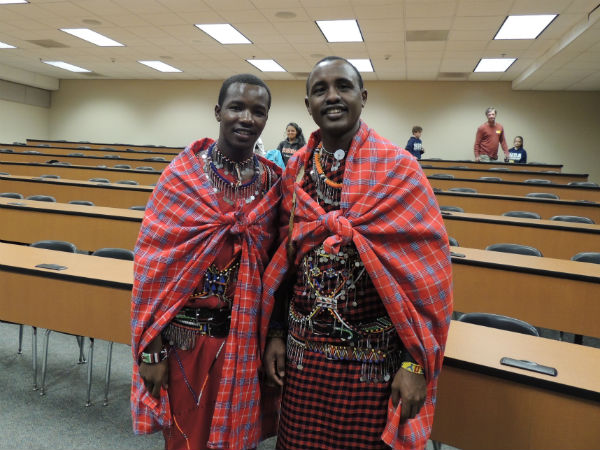On Tuesday, November 12th, two men with ornately beaded garments, elaborate jewelry, and signature warrior clubs stood out among the sea of CCHS polos and wrinkled khakis. Masses of students strained their necks to gain a better view of these seemingly foreign individuals; everything from their decorative attire to their gapped, toothy smiles screamed foreign. Wilson and Jackson Meikuaya, two Maasai warriors hailing from the grasslands of Kenya, visited 100 Cathedral sociology and government students, sharing their message of the value of education.
But, upon talking to them, I was led to one conclusion: they weren’t so different after all. Wilson and Jackson serve as volunteers for ‘Free the Children’ (FTC) in their native Kenya, an organization that strives to provide a better tomorrow for the next generation of children in the respective area. Since the Kenyan government deemed education available to all in 2002, the system can’t keep up – FTC builds additional schools to cater to groups of people who might face additional challenges, namely the Maasai and Kipsigi tribes of Africa.
The Maasai are a nomadic, pastoral people, sporadically migrating in search of clean water and grass for their cattle to graze on. For over a thousand years, 42 Maasai tribes roamed Kenya, each member having one ultimate goal: to become a Maasai warrior.
In order to become a warrior, the previous cultural requisite was to kill a lion; only men were allowed to become warriors. Both Wilson and Jackson killed lions in order to receive their warrior status; however, they were part of the last generation to do so. Given the rising role of women in society as well as the increasing endangerment of the wild lions found in Kenya, a new requisite had to be formed.
For the first time in Maasai history, an individual can attain warrior status not by killing a lion, but by receiving a degree. This not only makes it more feasible for many to achieve warrior status, but also helps ensure the economic stability of the next generation in an increasingly globalized world. Furthermore, it decreases crime rate.
“A major problem in my civilization was stealing,” said Jackson. “Now, with an education, a man can get a job and not be economically dependent on a life of crime.”
Wilson and Jackson also came to advocate for Free the Children, imploring the support of the Cathedral community. Through FTC, Maasai boys and girls are provided with a primary education. They are schooled in mathematics, sciences, cultural studies, and the Maa, Swahili and English languages. Free the Children also helps Maasai mothers find clean water, takes children to the African safari to study plants and animals, and helps the younger generation understand more about their culture.
As for the unique attire? Kaleidoscope-colored wraps, known as the Maasai blanket, are the norm for the tribe’s warriors; the vibrant red symbolizes their power, and simple sandals made of tire adorn their feet. The gapped smiles aren’t a result of poor dental care – in Maasai culture, two bottom teeth are often removed because it is considered to be the vogue style.
Wilson and Jackson are just two of many in the Maasai culture who value the importance of education. “Kids in America don’t always know how important their education is,” said Wilson. “But to many Maasai children, it is the most valuable thing they can have.”






















































